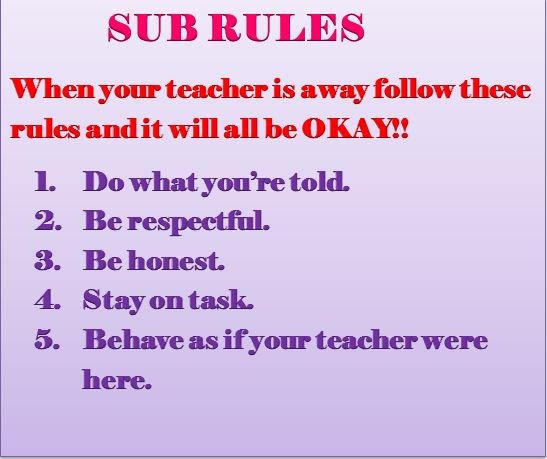Classroom Management
It can be difficult to walk into a class that isn’t yours and expect to have complete control over the classroom. These sub rules are short and to the point and you can easily bring them with you wherever you go.

William Glasser’s Seven Deadly Habits
According to Glasser, there are seven deadly habits that inhibit teacher’s ability to establish good relationships with students and gain their willing cooperation:
- Criticizing
- Blaming,
- Complaining,
- Nagging,
- Threatening,
- Punishing,
- Rewarding students to control them.
These are habits that teachers should avoid doing in the classroom at all costs. Instead, teachers should replace these Seven deadly sins with positive influence and good thoughts such as:
Caring, Listening, Supporting, Contributing, Encouraging, Trusting, and Befriending.
Students always wish to feel important and appreciated, so let them know! Glasser believes following this advice will make student more amicable towards you and willing to co-operate in the classroom.
(Charles, C.M.. Building Classroom Discipline. Pearson Education Inc (2014). Pages 36-37.)
Fred Jones’ Non-Verbal Communication:
How to use Body Language effectively to promote good behaviour
- Eye contact: Pausing to look a disrupting student in the eye is often enough to get that student to strengthen up an return to paying attention.This conveys an impression of being in control.
2. Physical Proximity: Moving towards disruptive students will make them aware of your presence and will get most to return to their classwork without the teacher even needing to utter a word.
3. Body Carriage: Good posture and a confident demeanor can effectively communicate authority and good leadership, while drooping, tired postures show fearfulness and resignation. Students read body language to see if the teacher feels that they are in charge or not.
4. Facial Expressions: Facial expression can show a great number of emotions such as appreciation, seriousness, and enthusiasm, which can lead to good behaviour. Smiles show off good humour as well, which many students will appreciate.
(Charles, C.M.. Building Classroom Discipline. Pearson Education Inc (2014). Pages 37-38.)
How can I win an argument against my students?
Answer: You don’t!
Arguing is a self-defeating pitfall that should be avoided at all costs. It is a waste of time as arguing by telling someone they are wrong rarely ever changes their minds and actions. Instead, arguing will make the students more resistant to your point of view and cause them to turn angry or defensive. Wounded pride does not seek cooperation.
(Charles, C.M.. Building Classroom Discipline. Pearson Education Inc (2014). Page 40.)